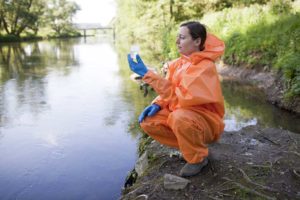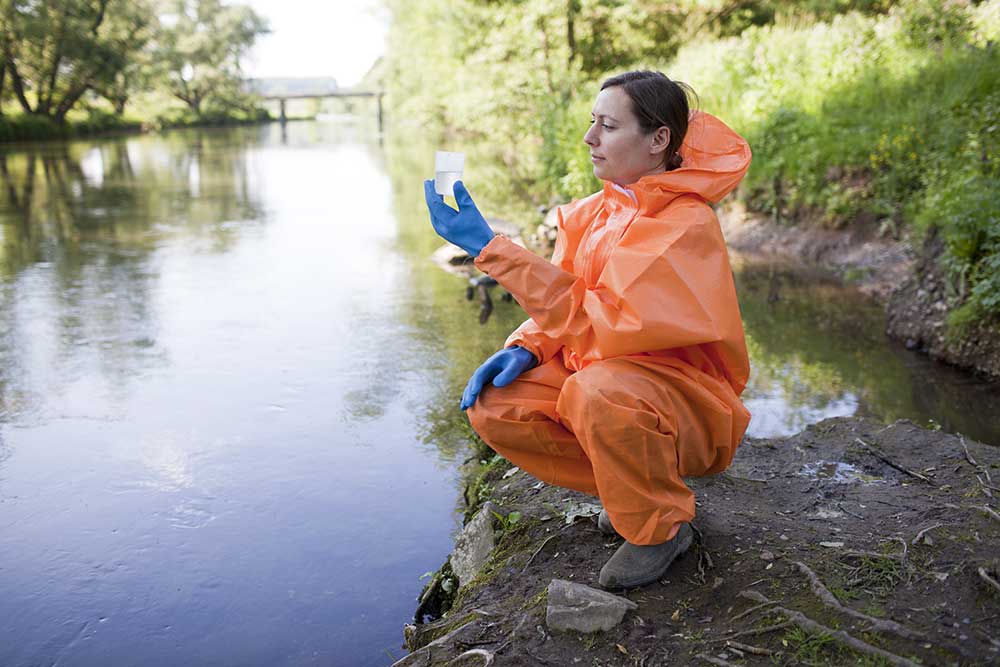Disclaimer: The information on our website is provided for general information purposes only. We make no representations or warranties of any kind, express or implied, about the completeness, accuracy, reliability, suitability or availability with respect to the website or the information contained on our website for any purpose. Any reliance on such information is therefore strictly at your own risk and we are not liable for any damages or losses arising out of or resulting from your reliance on any information contained on our website.
An environmental engineering technician collects environmental samples from the air, ground, or water. Additionally, through their testing they strive to contain, mitigate, or clean up pollution. Watch a video to learn what an environmental engineer does.
How to Become an Environmental Engineering Technician
Normally environmental engineering technicians can gain employment holding an associate’s degree in environmental engineering or a related field. Though community colleges may offer courses in environmental engineering, programs are also offered in vocational and technical schools. However, some environmental engineering technicians are hired with a bachelor’s degree in a natural science like chemistry or biology. A newly hired environmental engineering technician starts out as a trainee and gains experience to handle more responsibility. Those with bachelor’s degrees often go on to obtain an engineering position and some are then promoted to supervisory positions.
Job Description of an Environmental Engineering Technician

Technicians set up and modify equipment used for cleaning up or preventing environmental pollution. Additionally, they keep the laboratory adequately supplied with material and equipment through ordering from vendors. They also arrange to dispose of hazardous materials such as asbestos and lead and inspect facilities to assure proper compliance with regulations to govern substances are observed. These techs record all the information they gather including all photographs.
In addition, they also need the skills of observation, listening, reading and critical thinking. Because they work under engineers as part of a team, they require good communication skills and the ability to interact with superiors and co-workers.
Environmental Technician Career Video Transcript
Environmental pollution makes headlines in the news from time to time, but it’s the top concern every day for environmental engineering technicians. They also run the equipment and collect test samples that monitor air and water quality to help keep the public healthy and secure. Environmental engineering technicians carry out the plans that environmental engineers develop. They operate equipment used to prevent or clean up environmental pollution, and modify the equipment to meet a particular need. They collect air and water samples, and work to mitigate sources of environmental pollution, including lead, asbestos, and other hazardous materials.
In laboratories, and when inspecting facilities for compliance, these technicians record observations and test results. Additionally, some are responsible for maintaining supplies in their laboratories. Most technicians work full-time, regular business hours, in labs. If called on to contain a major environmental threat, or perform other work in a remote location, longer hours are common.
Environmental engineering technicians can be exposed to hazards, and may need to wear hazmat suits, heavy rubber boots, and sometimes respirators, even in warm weather. Most environmental engineering technicians work in engineering services, consulting services, government, waste management, and manufacturing. An associate’s degree in environmental engineering technology or a related field is required to enter the field. High school science and math courses are helpful.
Article Citations
Bureau of Labor Statistics, U.S. Department of Labor, Occupational Outlook Handbook, Environmental Engineering Technicians.
National Center for O*NET Development. 17-3025.00. O*NET OnLine.


